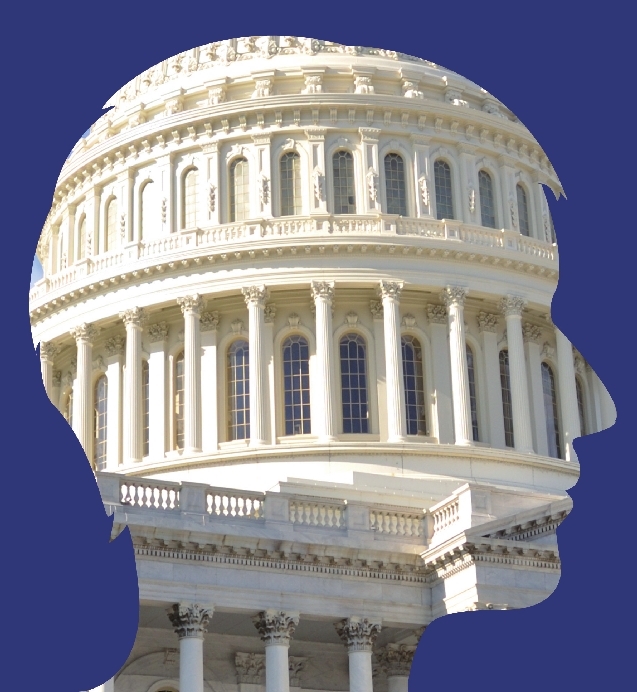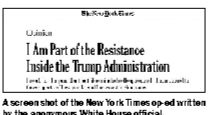



AN unnamed senior Trump administration official assailed U.S. President Donald Trump’s “amorality” and reckless decision-making in a New York Times op-ed published Wednesday and said he or she is part of a “resistance” working to thwart Trump’s worst impulses. “The dilemma — which (Trump) does not fully grasp — is that many of the senior officials in his own administration are working diligently from within to frustrate parts of his agenda and his worst inclinations,” the piece reads. “I would know. I am one of them.” The New York Times said disclosing the name of the official, who is known to the publication, would jeopardize the official’s job, and that publishing the piece anonymously was the only way to deliver an important perspective to readers. Major newspapers almost never publish unnamed op-ed pieces. At The New York Times, it is very rare, but not entirely unprecedented. The op-ed came on the heels of reports based on a damning book about Trump’s presidency by veteran journalist Bob Woodward and amplified the sense that top advisers to the president have serious concerns about his conduct in office and leadership abilities. And it is likely to compound Trump’s sense of paranoia that he is surrounded by advisers who may be duplicitous and untrustworthy. Trump quickly lashed out Wednesday, dismissing the op-ed as “really a disgrace” and “gutless” and assailing the author and The New York Times for publishing the anonymous opinion piece. “We have somebody in what I call the failing New York Times that’s talking about he’s part of the resistance inside the Trump administration,” Trump said. “This is what we have to deal with. And you know the dishonest media. ... But it’s really a disgrace.” Trump later tweeted a pointed and unsubstantiated attack on the newspaper, questioning if the author of the op-ed exists. If the author does exist, the organization should publicly identify the individual, Trump said. “If the GUTLESS anonymous person does indeed exist, the Times must, for National Security purposes, turn him/her over to government at once!” Trump tweeted. The op-ed offers a firsthand account that corroborates key themes of Woodward’s book: that some of the president’s top advisers have a dim view of the commander-in-chief and are quietly working to thwart Trump’s most reckless and impulsive decisions from becoming a reality. The author writes the resistance inside the Trump administration is not the same “resistance” of the left against the president and said they and like-minded colleagues working to thwart some of Trump’s actions “want the administration to succeed ... But we believe our first duty is to this country, and the president continues to act in a manner that is detrimental to the health of our republic.” “That is why many Trump appointees have vowed to do what we can to preserve our democratic institutions while thwarting Mr. Trump’s more misguided impulses until he is out of office.” The result, the official writes, has been a “two-track presidency” in which Trump’s own worldview — uttered both in public and private — diverges from some key actions taken by the administration, like those involving additional sanctions against Russia. A dramatic alternative to the quiet effort to thwart some of Trump’s more concerning actions was, however, considered, the official said: invoking the 25th Amendment. The official alleges there were “early whispers within” Trump’s Cabinet of invoking the 25th Amendment, which would require a majority of Cabinet officials to declare to U.S. Congress they believe the president is “unable to discharge the powers and duties of his office.” Explaining the “resistance” effort, the senior administration official offers a damning portrait of Trump’s character and leadership ability. The author argues the “root of the problem is the president’s amorality” and assails Trump’s “reckless decisions,” “erratic behavior” and what the official describes as the president’s “impetuous, adversarial, petty and ineffective” leadership style. “The root of the problem is the president’s amorality. Anyone who works with him knows he is not moored to any discernible first principles that guide his decision making,” the official writes. “Although he was elected as a Republican, the president shows little affinity for ideals long espoused by conservatives: free minds, free markets and free people.” “It may be cold comfort in this chaotic era, but Americans should know that there are adults in the room. We fully recognize what is happening. And we are trying to do what’s right even when Donald Trump won’t,” the official writes. “This isn’t the work of the so-called deep state. It’s the work of the steady state.” Trump administration officials, struggling to mount a defense to Woodward’s tell-all book, were stunned when the op-ed was published Wednesday afternoon, left guessing and quietly pointing fingers at other officials as they tried to figure out who wrote it, even texting reporters possible guesses. Some echoed the sentiment voiced by White House press secretary Sarah Sanders that the official should resign. “The individual behind this piece has chosen to deceive, rather than support, the duly elected president of the United States,” she wrote in a statement. “He is not putting country first, but putting himself and his ego ahead of the will of the American people. This coward should do the right thing and resign.” Others called it as a bombshell — noting how the author of the op-ed said multiple people in the administration felt the same way. But the op-ed, compounded by Woodward’s book sourced to numerous current and former White House officials, has left Trumpworld feeling under siege. “I guess it’s open warfare on Trump,” one Trump ally said after the op-ed’s publication. The president started the day waging a witch hunt on who did — and who didn’t — talk to Woodward. He was taking careful note of who had — and hadn’t — issued statements of denial. This witch hunt escalated dramatically — and suddenly included the anonymous author of The New York Times essay, one administration official said, with the president intent on knowing who wrote the words he suggested could be treasonous.(SD-Agencies) Bob Woodward’s new book A new book by Bob Woodward, the longtime Washington Post reporter, portrays a White House with relentless infighting and a work culture so toxic and volatile that many of President Donald Trump’s top advisers and Cabinet members became accustomed to working around their boss, whom they described as unstable and uninformed. “Fear: Trump in the White House,” which is set for a public release next Tuesday and already sits atop Amazon’s bestseller list, is one in a series of insider accounts published this year that have drawn the ire of the West Wing. “Fire and Fury,” by the writer Michael Wolff, and “Unhinged,” by the former White House adviser Omarosa Manigault Newman, also reported the kind of hostility and interpersonal feuding that Woodward depicts. Trump reacted to both books with numerous tweets targeting the authors. For the past two weeks, Newman has savored her position at the top of the New York Times bestseller list for “Unhinged.” She said “Woodward’s book will be a great complement to mine.” Woodward, the famed Watergate journalist who helped bring down former President Richard Nixon, writes that his book is drawn from hundreds of hours of interviews with firsthand participants and witnesses that were conducted on “deep background,” meaning the information could be used but he would not reveal who provided it. Woodward depicts Trump’s anger and paranoia about the Russia inquiry as unrelenting, at times paralyzing the West Wing for entire days. Learning of the appointment of Mueller in May 2017, Trump groused, “Everybody’s trying to get me”— part of a venting period that shellshocked aides compared to Nixon’s final days as president. Woodward sought an interview with Trump through several intermediaries to no avail. The president called Woodward in early August, after the manuscript had been completed, to say he wanted to participate. The president complained that it would be a “bad book,” according to an audio recording of the conversation. Woodward replied that his work would be “tough” but factual and based on his reporting. The book’s title is derived from a remark that then-candidate Trump made in an interview with Woodward and Washington Post political reporter Robert Costa in 2016. Trump said: “Real power is, I don’t even want to use the word, ‘Fear.’” A central theme of the 448-page book is the stealthy machinations used by those in Trump’s inner sanctum to try to control his impulses and prevent disasters, both for the president personally and for the nation he was elected to lead. Woodward describes “an administrative coup d’etat” and a “nervous breakdown” of the executive branch, with senior aides conspiring to pluck official papers from the president’s desk so he couldn’t see or sign them.(SD-Agencies) | 
